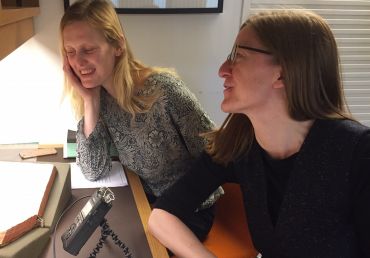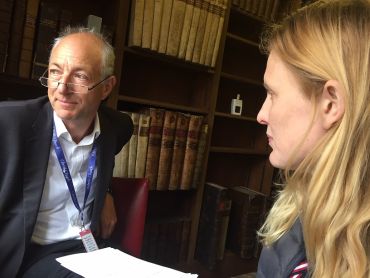
The New Anatomy of Melancholy
Robert Burton was a scholar at the University of Oxford 400 years ago. He drew on the collections of the Bodleian Library and Christ Church, where he was himself Librarian, to seek to understand the human condition, in its full emotional range.
But his declared subject was 'melancholy'. The Anatomy of Melancholy, first published in 1621, is an extraordinary and enormous attempt to grapple with the causes, symptoms, and treatments of that universal human experience.
Four hundred years later, when clinical depression is stated to be the leading cause of global disability, and there are many challenges to our mental health, a new radio series for BBC Radio 4 is asking: how far have we come? And is there anything we can learn from Burton’s Anatomy of Melancholy to help us today?
 Amy Liptrot and Kathryn Murphy at the Bodleian Library
Amy Liptrot and Kathryn Murphy at the Bodleian LibraryWith Burton as a guide, the series hears from leading experts in mental health research today, and from those who manage their struggles with sadness and depression in a variety of ways - including the gardener and broadcaster, Monty Don, pioneering cell biologist and author of Malignant Sadness: the anatomy of depression, Lewis Wolpert, and a young survivor from the Manchester Arena attack.
 John Geddes and Amy Liptrot at Christ Church
John Geddes and Amy Liptrot at Christ Church
Each episode takes on a different theme from Burton's Anatomy, covering causes such as: genetics ('an hereditary cause'), inflammation ('inflammations of the head'), inequality ('poverty and want'), trauma ('terrors in the night') and possible 'cures' such as nature, 'merry company', ‘divine music’, sleep, friends, exercise.
 Bust of Robert Burton at Christ Church Cathedral
Bust of Robert Burton at Christ Church Cathedral‘We've explored the part of melancholy in the human condition, how it can be alleviated and lived with - and the unique voice of Burton has been a brilliant guide though it all.’
The series shines a light on common experiences and connections over time and the ways in which science is catching up with the intuitions and understanding from 400 years ago and beyond.
Robert Burton talks about his own struggles with melancholy and reveals a personal vulnerability when he says: 'I write of melancholy, by being busy to avoid melancholy.' The series explores the potential of writing and reading to give purpose, better understand one's experiences and connect with others. Perhaps there has never been a better moment to pause and reflect on melancholy: ways to understand it, alleviate it and accept it.
The actor Simon Russell Beale narrates sections of Robert Burton’s text throughout the series.
Professor John Geddes is series consultant for The New Anatomy of Melancholy.
Dr Kathryn Murphy’s book Robert Burton: A Vital Melancholy will be published in 2021.
The Bodleian Library is curating an exhibition based around The Anatomy of Melancholy, due to open in the autumn, 2021.
The 10-part series The New Anatomy of Melancholy begins on BBC Radio 4, Monday 11 May 2020 at 1.45pm.
Listen here: https://www.bbc.co.uk/programmes/m000j1jq